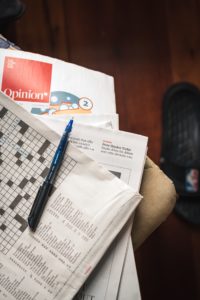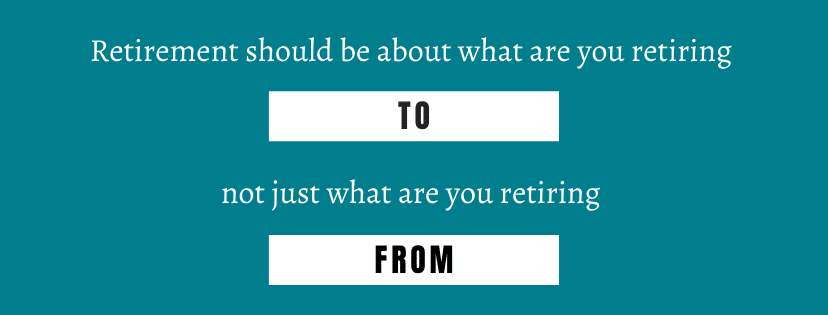Life lessons can be learned from observing others. You can learn what to do and what not to do.
From my dad I learned about the quality of life during retirement. The ‘golden years’ don’t happen by chance. Planning is key to successful retirement – planning beyond the finances.
Retirement should be about what are you retiring To – not just what are you retiring From.
I observed my parents being engaged in life. They did well at developing the vitamin C’s of retirement as expressed by Mitch Anthony in his book The New Retirementality.
Connectivity
A study at the University of Michigan found that the most powerful predictor of life satisfaction after retirement was not health or wealth, but the breadth of a person’s social network.
I saw that very clearly with my parents. They were engaged in many social circles – bridge club, genealogy, OSEA, church and the neighborhood. It helped that they had resided the 20 years before retirement in the same house. They had established interests and connections.
These connections served them well when leaving behind the daily social network of the workplace. They were also beneficial after my mom’s stroke. While we had extra help in the house, it was the friendships that kept my dad from getting lost in the care giving.
In contrast, my in-laws did not have many relationships outside of the workplace. They became reclusive. The relied heavily on family for social interaction. What little outside social world my mother-in-law had dissolved when her husband required constant care.
Encouraging involvement with groups of common interest hobbies fell on deaf ears. I felt the ache of the loneliness of my mother-in-law when she lost her husband just a few years after they retired. She never did establish relationships outside of family.
Don’t wait until you retire to establish those networks. Build them now. Explore your hobbies and interests and attach people to them. Meet-up is a great way to connect with others in your community.
 Challenge
Challenge
The latest Alzheimer’s research demonstrates that being regularly challenged intellectually can hold back the degenerative processes leading to both Alzheimer’s and Dementia. The brain is a muscle that atrophies without use.
My dad was a lifetime learner. He had multiple bookcases filled with books with a wide range of topics. He took classes at the local college. Often colleges will allow seniors to audit classes for a nominal fee. More and more retirees are moving to university towns for educational opportunities.
Other activities I observed my dad and mother-in-law engage in were crossword puzzles and Sudoku. Dad was involved with bridge clubs and poker group, activities of mental challenge and social interaction. My mother-in-law’s favorite activity was going to Jackpot. She frequently received a 1099 for her winnings. Neither of these two experienced any dementia in retirement.
Curiosity
“Curiosity guarantees a pulse in the brain and a reason to keep our bodies healthy. The important thing is to have curiosity and desire to grow.” Mitch Anthony of The New Retirementality.
Both of my parents were interested in life. They attended many lectures by OSEA. They watched the news daily, read the newspaper. Discussions at the dinner table were interesting with a Republican father and a Democratic mother. We learned to be open minded and embrace the world around us.
Community Education has many classes that allows one to explore. Some classes are taught by instructors who just want to share their skill, others by professionals who offer further classes at their place of business. You can ‘test’ before buying.
 Creativity
Creativity
Creativity comes in many shapes and sizes. You don’t have to be an artist or musician to be creative. Creativity allows you to color outside the box, set aside rules, experiment. Creativity allows you to express who you are.
My dad’s creativity outlet was gardening. He had the corner lot in the cul-de-sac. He developed different flower beds and tiered landscapes. He planned each year what he was going to add. His neighbors also enjoyed the fruit of his handiwork.
My mother-in-law’s creative expression was in needlework. She crocheted gorgeous afghans and fine detailed work with thread. The crocheted table cloth on the coffee stand in my office is her handiwork. When she was in rehab, her hands would move in her sleep like she was crocheting.
Charity
Studies have shown that those who are generous and charitable, are more content and happier than those who hoard. Charity isn’t just about giving money. It is sharing your time, talent and resources. Seniors have an abundance of knowledge and experience to offer to their community. Find a cause you are passionate about and get involved.
Dad shared his gardening experience with a wide range of friends and family. He would show neighbors and young people how to thin the bulbs each year and send them home with bulbs to plant.
I have learned a lot from observing my dad in his retirement years. It gives me a place to begin.
What have you observed that creates quality of life in retirement?
1. University of Michigan, Health and Retirement Study, http://hrsonbline.isr.umich.edu
2. Alzheimer’s Association, alz.org, Brain Health – 10 Ways to Love Your Brain
3. Greater Good Magazine – 5 Ways Giving is Good for You, greatergood.berkley.edu/article/item/5_ways_giving_is_good_for_you#

 Challenge
Challenge Creativity
Creativity